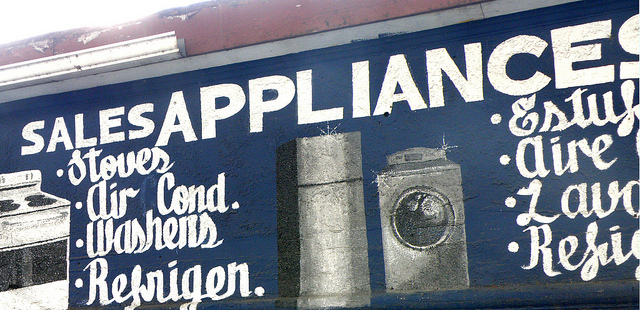When a household appliance such as a refrigerator or washing machine needs replacing, many of us take for granted that we will either be able to afford to pay cash for the replacement, or to access mainstream finance such as a personal loan or credit card. For many Australian welfare recipients, however, mainstream finance is not an option as they do not meet the eligibility criteria. This group of people often resort to higher-interest consumer leases which worsen financial hardship.
More than half of the Australian consumer lease market is conducted through Centrepay. The repayments on the lease are taken out of people’s welfare benefits automatically by Centrelink. The lease contract terms are often complex and confusing, and accompanied by high-pressure sales tactics.
A 2016 review of ‘small amount credit contract’ laws, including leases to Centrepay customers, found that predatory and exploitative marketing and sign-up practices were targeting low-income people. This causes deterioration in people’s health, housing security and financial inclusion. The terms of these consumer leases are onerous—some contracts can result in consumers paying three times the cost of an item such as a refrigerator—and effective interest rates on these leases are up to 70 per cent. The burden on welfare recipients causes particular hardship.
To give an indication of the size of the market for leasing consumer goods to people on welfare, Centrepay deductions can make up about half of the nearly $200 million revenue of a consumer leasing company. This means that $100 million tax dollars are being transferred annually through Centrepay to just one of the companies operating in the consumer leasing market. Even more worryingly, companies with a history of being punished for breaking the law by ASIC (the Australian corporate regulator), have been permitted to retain access to Centrepay.
The federal government response to the 2016 review fell short of addressing the problems in several crucial respects. The response to the 2016 review is contained in a 2017 draft bill, which has yet to be enacted into law. The response recommends some modest changes to the terms of the contracts which consumer lease companies can sign with Centrepay customers. These recommended changes will not prohibit consumer lease companies from charging Centrepay customers more than a standard mainstream loan. For example, a four-year lease could still cost the Centrepay customer nearly 3 times the value of the leased item.
This is a missed opportunity to prevent financial hardship. We need much more radical changes to the sorts of contracts that consumer lease companies are permitted to offer low income customers.
Bar access to Centrepay by exploitative lease companies
The starting point for a better response by the Government could have been to bar access to Centrepay by companies that offer expensive leases on high-interest terms.
This measure on its own would not change the fact that low-income people have problems accessing finance. If a person who is dependent on welfare needs a new washing machine and cannot obtain a mainstream loan, they need another, non-exploitative, option.
Expand no-interest loans for low income consumer leases
Expanding access to affordable finance is a proven solution to this problem. Australia needs new micro-finance options, but the government has failed to explore any options that would expand access. Expanding no-interest loan schemes would be an effective alternative to consumer lease contracts. The government would also need to improve awareness of these schemes.
There are some existing federal subsidies for micro-lending, including the Good Shepherd Microfinance no-interest loan scheme, currently estimated at a cost of $33.3 million over 5 years. This can be contrasted with the hefty annual Centrepay deductions for consumer lease payments. National Australia Bank provides another $130 million in corporate microfinance capital.
Eligibility criteria for the Good Shepherd Microfinance no-interest loan scheme require a borrower to hold a healthcare or pension card and/or have an income of less than $45,000, have lived at their address for three months, and have a willingness and capacity to repay the loan. No credit checks are conducted. The loan amount is $1500, which can be repaid, without interest, over 12 to 18 months. The loan can be used to obtain essential household goods such as refrigerators, washing machines, stoves, clothes dryers, freezers and furniture, education needs such as computers and textbooks, certain medical and dental services, and some other items if requested.
Subsidised no-interest loan schemes are not universally available or accessible to low-income people, especially in less densely populated parts of Australia. The pool of finance is limited because no-interest loans operate as ‘circular community credit’. When a borrower repays some of the loaned capital, that money is then available to the next person requiring a micro-finance loan.
The Government’s response to low income consumer lending is disappointing. The legislative reforms in the draft bill will be further reviewed three years after they become law. The government should change its approach to expand access to no-interest credit, which will improve low-income people’s economic mobility and avoid the debt trap of paying a premium for basic household goods.






Recent Comments